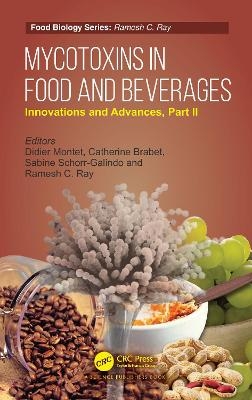
Mycotoxins in Food and Beverages
CRC Press (Verlag)
978-1-032-00839-4 (ISBN)
Mycotoxins are secondary metabolites produced by fungi in a wide range of foods (cereals, peanut, tree nuts, dried fruits, coffee, cocoa, grapes, spices…) both in the field and after harvest, particularly during storage. They can also be found in processed foods of plant origin, or by transfer, in food products of animal (milk, eggs, meat and offal). Mycotoxins are of major concern since they can cause acute or chronic intoxications in both humans and animals which are sometimes fatal. Many countries, particularly in Europe, have set maximum acceptable levels for mycotoxins in food and feed.
The book reviews the latest literature and innovations on important aspects of mycotoxins, e.g. mycotoxin producing fungi and the related ecosystems, mycotoxin occurrence, toxicity, analysis and management. Quantitative estimation of impacts of climate change on mycotoxin occurrence have been made recently, using predictive modelling. There is also a growing interest in studying the occurrence and toxicity of multiple mycotoxins in food and feed, including emerging or modified forms of mycotoxins. Innovative tools have also developed to detect and quantify toxinogenic fungi and their toxins. In order to reduce the use of chemicals that are harmful to the environment and health of consumers, alternative methods of prevention and decontamination of mycotoxins were tested in pre- and post-harvest, using microorganisms, natural substances or radiation treatments.
Dr Didier Montet obtained his PhD in food microbiology in 1984. He conducts research in food safety and microbial ecology. He is a national expert in biotechnology and additives at the French Food Safety Agency (ANSES). He is an international expert (FAO, French embassies, international foundations). He published 230 articles and 8 books in the field of fermentations, traceability, mycotoxins. He participated to 8 European projects. He has developed a collective expertise methodology to identify food hazards. Dr Catherine Brabet obtained her PhD in Food Science. She conducts research in food safety and quality management in relation with market and regulatory requirements, and had 14 years’ experience in Latin America and Africa, with 6 years in CGIAR research centers (CIAT and CIP). Since 2003, she has been coordinating and/or participating in European and international projects on mycotoxin prevention and control in food, and she carried out consultancy for the EU initiative BTSF (Better Training for Safer Food). Prof. Sabine Schorr-Galindo obtained her PhD in food microbiology in 1996. She conducts research and training at the Montpellier University in food safety, microbial ecology and biological control. She is a national expert in fungal pathogens at the French Food Safety Agency (ANSES) and at the French Scientific Steering Committee "Research and Innovation" of the ecophyto2+ plan for sustainable agriculture. Since 2000, she has coordinated 6 French and European projects and published 50 articles, 3 special issues and 3 book chapters on prevention and control of fungi and mycotoxins. Dr. Ramesh C. Ray is a former Principal Scientist (Microbiology) and Head of the ICAR- Central Tuber Crops Research Institute (Regional Centre), Bhubaneswar, India. He has 35 years of research experience in agriculture and food microbiology, published 140 research and review papers in international journals, 63 books chapters, edited 14 books and authored 3 books. He is a distinguished fellow of the prestigious National Academy of Agricultural Sciences, New Delhi, India and 10 other scientific societies.
Foreword. Preface. Trichoderma species: Novel metabolites active for industry and biocontrol of mycotoxigenic fungi. Food processing and decontamination approaches to control mycotoxins. New Insight of Preventive and Curative Approaches to Reduce Aflatoxin B1 (AFB1) and Ochratoxin A (OTA) Contamination. Microbial characterization of organic amendment and their potential for biocontrol of phytopathogenic and mycotoxinogenic fungi in amended soil. Advances and Criticisms on the Use of Mycotoxin Detoxifying Agents. Plants for plants: Would the solution against mycotoxins be the use of plant extracts? Binders used in feed for their protection against mycotoxins. Toxicology of mycotoxins: Overview and challenges. Gut Microbiome and Their Possible Roles in Combating Mycotoxins. Climate Change, Toxigenic Fungi and mycotoxins. Are there advantages of GMO on mycotoxins content?
| Erscheinungsdatum | 11.07.2023 |
|---|---|
| Reihe/Serie | Food Biology Series |
| Zusatzinfo | 13 Tables, black and white; 8 Line drawings, color; 9 Line drawings, black and white; 2 Halftones, color; 2 Halftones, black and white; 10 Illustrations, color; 11 Illustrations, black and white |
| Verlagsort | London |
| Sprache | englisch |
| Maße | 156 x 234 mm |
| Gewicht | 460 g |
| Themenwelt | Naturwissenschaften ► Biologie ► Genetik / Molekularbiologie |
| Technik ► Lebensmitteltechnologie | |
| ISBN-10 | 1-032-00839-3 / 1032008393 |
| ISBN-13 | 978-1-032-00839-4 / 9781032008394 |
| Zustand | Neuware |
| Informationen gemäß Produktsicherheitsverordnung (GPSR) | |
| Haben Sie eine Frage zum Produkt? |
aus dem Bereich


